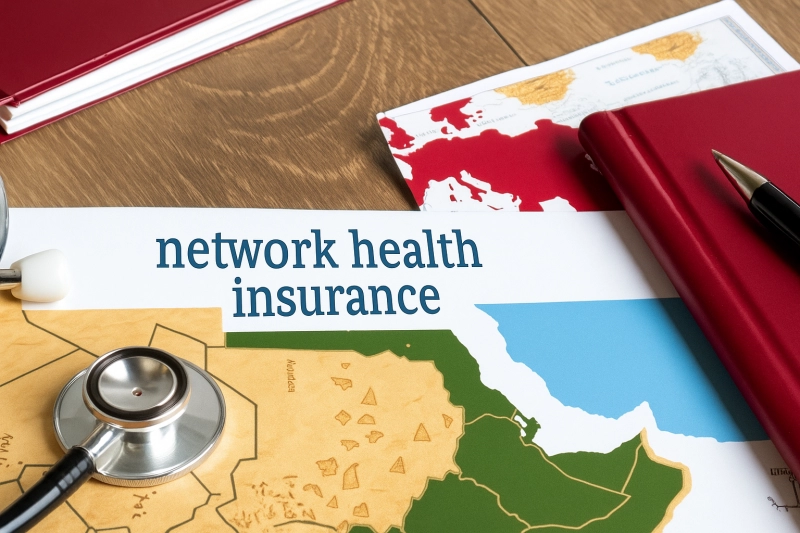Navigating the Network Health Insurance Landscape Across MEA
The Middle East and Africa (MEA) region presents a diverse and often complex array of health insurance systems. Understanding this landscape is essential for both residents and newcomers. This means recognizing the differences between the established systems, like the often mandatory programs in the Gulf states, and the developing insurance markets in other parts of Africa. This overview aims to shed light on these variations.
Understanding The Key Regional Differences
A primary distinction within the MEA region lies in the role of government. In many Gulf countries, mandatory health insurance is the standard, with established regulations and broad coverage. However, in other areas, such as parts of sub-Saharan Africa, health insurance markets are still emerging, often with a combination of public and private options.
This difference significantly impacts access, affordability, and the overall quality of healthcare. Factors such as local regulations and economic development play a crucial role in shaping the availability and scope of insurance plans.
Cultural factors also influence health insurance practices. For example, family-centric cultures often affect the types of plans offered and how they cover dependents. This can also shape perspectives on preventive care and overall health expenditures. Grasping these cultural nuances is vital for making informed decisions.
The MEA region’s health insurance market is experiencing substantial growth. Projections indicate the market could reach USD 186,081.64 million by 2029. This expansion is fueled by regulations mandating health insurance, particularly in nations like the UAE and Saudi Arabia.
Find more detailed statistics here: This growth presents both opportunities and challenges for consumers.
Public vs. Private Health Insurance
Another key element of understanding health insurance in the MEA region is the interplay between public and private providers. Government-funded healthcare systems typically provide basic coverage, while private insurance offers supplemental or more comprehensive plans.
The balance between these two sectors differs significantly across countries, impacting individual choices and the overall healthcare costs. For example, expats in the UAE often choose private health insurance to access a broader network health insurance of hospitals and specialists.
In contrast, residents in countries with established public systems may primarily rely on government-provided coverage. These decisions depend on individual needs, budget, and the specific healthcare infrastructure within each country. Understanding these differences is essential for securing the best health insurance coverage.
Understanding Mandatory Health Insurance Requirements
Navigating the complexities of health insurance can be challenging. Understanding mandatory coverage adds another layer of complexity, particularly in the AE region. Here, regulations are key to ensuring access to quality healthcare for everyone. This section clarifies these requirements for both employers and employees.
Decoding The Legal Jargon
Mandatory health insurance laws require specific groups to have health coverage. This often includes residents, employees, and sometimes their dependents. For instance, in Dubai and Abu Dhabi, employers are legally obligated to provide health insurance for their staff. These laws aim to protect individuals from financial hardship due to illness or injury, guaranteeing access to vital medical services.
These regulations have significantly changed workplace benefits. Health insurance has shifted from a perk to a requirement. This change creates a more secure environment for employees and lessens the strain on the public health system. It also ensures employers share responsibility for their employees' well-being.
Real-World Scenarios: How Mandatory Coverage Works
Let's explore how mandatory health insurance functions in practice. In the UAE, when changing jobs, your new employer is responsible for your continued coverage without interruption. Similarly, health insurance proof is usually required for visa applications.
Family coverage is also vital. Often, dependents like spouses and children must also be insured under the mandatory scheme. This protects families from unexpected medical expenses and encourages overall well-being. For more detailed information, see: A Complete Guide to Dubai’s Mandatory Health Insurance Laws
Penalties And Enforcement
What are the consequences of non-compliance? Penalties exist and vary by jurisdiction. These can include fines for both employers and individuals, along with issues regarding visa renewals and other administrative hurdles. Consistent enforcement emphasizes the importance of adhering to these regulations.
Many African countries are also implementing health insurance strategies, though with varying approaches. Countries like Kenya, Ghana, and Rwanda have national health insurance schemes to lower out-of-pocket expenses and improve access for lower-income populations. In the Gulf Cooperation Council (GCC) countries, mandatory health insurance laws have substantially increased insurance coverage
Learn more here Understanding specific local requirements and penalties is crucial to avoid potential problems. Being proactive in this regard always pays off.
Choosing The Right Health Insurance Plan For Your Situation

This chart compares average monthly premiums, deductibles, and out-of-pocket maximums for comprehensive health insurance plans. Higher premiums often mean lower out-of-pocket costs if you need significant medical care, but also represent a larger upfront investment. This trade-off is a key factor when choosing a plan.
Assessing Your Healthcare Needs
Finding the right health insurance begins with understanding your needs. Honestly evaluate your health, anticipated medical expenses, and specific requirements. For instance, those with chronic conditions may need access to specialists, while frequent travelers might value international coverage.
Consider your family’s needs too. This includes dependents, their ages, and any pre-existing conditions. Understanding your family's collective needs helps you choose a plan with suitable coverage for everyone.
Navigating Plan Options in the AE Region
The AE region offers diverse health insurance options, from basic plans to comprehensive coverage. Basic plans typically have lower premiums but might limit coverage to essential services. Comprehensive plans provide broader coverage, often at higher premiums.
Your decision involves balancing affordability with your coverage needs. Comparing plans side-by-side helps you see how their benefits and network health insurance options align with your needs. For more guidance, see our guide on How to choose the best health insurance in the UAE.
To help you compare, we've created a comparison guide outlining the different plan types available in the MEA region.
Health Insurance Plan Comparison Guide
| Plan Type | Monthly Premium Range | Coverage Benefits | Network Size | Best For |
| Basic | $50 - $150 | Limited to essential services, such as doctor visits and hospitalization | Small to medium | Individuals and families on a tight budget who are generally healthy |
| Standard | $150 - $300 | Broader coverage, including specialist visits, diagnostic tests, and some preventative care | Medium to large | Individuals and families looking for a balance of affordability and coverage |
| Comprehensive | $300+ | Extensive coverage, including specialist visits, diagnostic tests, preventative care, maternity care, and international coverage | Large | Individuals and families who want the most comprehensive coverage and are willing to pay a higher premium |
This table highlights the key differences between basic, standard, and comprehensive health insurance plans, focusing on premium range, coverage benefits, and network size. Choosing the right plan depends on your individual needs and budget.
Evaluating Network Providers and Benefits
When choosing a plan, consider the network health insurance providers. Ensure the plan includes doctors, specialists, and hospitals that are convenient for you. This simplifies access and may affect out-of-pocket expenses.
Also, examine the specific benefits. Pay attention to prescription medication coverage, maternity care, and mental health services. Understanding these details helps you make informed decisions that suit your lifestyle. Thorough evaluation is crucial for maximizing your coverage.
Managing Health Insurance Costs Without Sacrificing Coverage
Health insurance is a vital investment, especially in the MEA region. However, the cost can sometimes feel overwhelming. This section offers practical strategies to help individuals and families find affordable health insurance without compromising essential coverage.
Understanding the Cost Factors
Several factors contribute to the price of health insurance premiums. These include your age, location, the type of plan you choose, and the number of dependents covered. Plans with broader provider networks and lower deductibles often have higher premiums.
Understanding these factors is crucial for managing costs. For example, a plan with a wider network might be more expensive upfront but offer greater flexibility in choosing doctors and specialists.
The regional economic climate also plays a role. Many lower-income expatriate workers face challenges finding affordable, comprehensive coverage. This is further complicated by regulatory differences between countries, which can make it difficult for insurers to operate across borders. In the MENA region, approximately 65% of informal sector workers lack social benefits, including health insurance.
Strategies for Reducing Costs
There are several ways to reduce your health insurance expenses. Maximizing employer contributions is a great starting point. Many employers offer substantial contributions towards employee health insurance. Understanding your company's policy can lead to significant savings.
Another effective strategy is opting for a higher deductible. While this means higher out-of-pocket expenses if you need care, it can significantly lower your monthly premiums. This approach is often suitable for individuals who are generally healthy. For further guidance, consider these tips:
Five Things to Consider When Choosing Health Insurance
If you're on a tight budget, exploring alternative coverage options can be beneficial. Co-operative health insurance schemes or government-subsidized plans might provide basic coverage at more affordable rates. These plans often have specific eligibility requirements, so research is key.
Maximizing Value From Your Plan
Choosing the right payment plan can also impact your overall costs. Some insurers offer discounts for paying premiums annually instead of monthly. While this requires a larger initial payment, it can result in noticeable savings over time.
Finally, take advantage of your plan's benefits. Many plans include preventive care services, such as vaccinations and annual check-ups, at little or no cost. Using these services can help you stay healthy and potentially avoid expensive medical issues in the future.
By understanding the factors that influence
health insurance costs and implementing these strategies, you can find a plan that meets your needs and budget. This proactive approach helps you prioritize both your health and your financial well-being.
Leveraging Digital Health Services And Modern Benefits
Healthcare technology is changing how we access medical care across the Middle East and Africa (MEA). Your health insurance should keep up with these changes. This section explores how insurers are using digital tools to make healthcare more convenient and affordable.
The Rise of Digital Health in the MEA Region
Progressive insurers are now including telehealth, digital prescriptions, and mobile health apps in their plans. Telehealth consultations, for example, offer remote access to doctors, reducing travel time and expenses. This is especially helpful for people in remote areas or during emergencies. Digital prescription services simplify refills and cut down on paperwork. Mobile apps provide personalized health monitoring and medication reminders.
These digital health solutions offer significant advantages, particularly in the UAE, where telehealth services are integrated into many health insurance policies. This integration facilitates remote consultations and digital prescriptions. However, access to these advancements isn't consistent across the region. Many low-income populations in African countries still rely heavily on out-of-pocket payments for healthcare. Learn more about this disparity:
COVID-19 and Insurance in the MENA Region Addressing this digital divide is crucial for equitable access to quality care.
Separating Value From Marketing Gimmicks
Not every digital health service is equally valuable. Some provide real benefits, while others are mainly marketing tactics. A user-friendly telehealth platform with secure messaging and video conferencing, for instance, is truly useful. In contrast, an app with limited features and poor integration with your health insurance plan offers less practical value.
Maximizing Modern Benefits With Your Health Insurance
To get the most out of your health insurance, understand the digital services it includes. Visit your insurer's website or contact their customer service to learn about available telehealth platforms, digital prescription services, and mobile apps. Familiarize yourself with how to access these services and resolve any technical problems. Use these tools to manage your health proactively and potentially reduce your out-of-pocket costs.
Choosing Insurers With Advanced Digital Features
When evaluating different
health insurance plans, consider the availability and quality of digital health services. Look for insurers that offer seamless integration between their digital platforms and their core insurance offerings. Prioritize features like secure messaging, video consultations, appointment scheduling, and prescription management within the app.
By taking advantage of these digital advancements, you can make your health insurance work more effectively for you. These services increase convenience, expand access to care, and empower you to take control of your healthcare experience.
Regional Differences And Country-Specific Considerations
Understanding health insurance in the Middle East and Africa (MEA) means recognizing each country's unique situation. From the Gulf to North Africa and down to sub-Saharan Africa, healthcare systems change drastically. These variations affect everything from required coverage to the quality of care you receive.
Navigating the Nuances of MEA Healthcare Systems
Healthcare systems across the MEA region vary significantly. For instance, many Gulf states offer advanced private healthcare alongside government options. Other areas may rely more on public healthcare infrastructure. This influences available health insurance plans and their costs. Also, coverage requirements for expatriates change from country to country.
Cross-border healthcare access presents another challenge. Some countries have agreements allowing residents to seek treatment in neighboring nations, while others don't. This affects people who travel often or live near borders. Cultural differences also play a role. Some treatments may be favored or avoided based on local beliefs and traditions. These factors are important when selecting insurance.
Practical Guidance for Expats in the UAE
Expats in the UAE face specific challenges. Our
guide for UAE expats addresses common questions and helps you find the right coverage. It covers the specifics of mandatory health insurance in Dubai and Abu Dhabi.
Regional Healthcare Quality and Provider Networks
Healthcare quality varies across regions. Understanding the quality of local hospitals and clinics is important when choosing a plan. Research Preferred Provider Networks (PPNs). A PPN is a group of providers contracted with an insurer to offer discounted services. Choosing a plan with a strong PPN in your area can reduce out-of-pocket costs.
Ensuring Continuity of Care Within the MEA Region
If you travel or move within the MEA region, maintaining continuous coverage is important. See if your plan offers international coverage or consider travel insurance for emergencies abroad. Some plans offer portability, letting you keep coverage when moving to another country. Understanding your policy's portability terms is key for a smooth transition.
To understand the varying health insurance landscapes in the MEA region, let's look at the following table summarizing key requirements by country.
Regional Health Insurance Requirements By Country
This table provides a breakdown of mandatory coverage requirements, minimum benefit levels, and key regulations across major MEA countries. It highlights differences and helps individuals understand the varying landscape of healthcare regulations.
| Country | Mandatory Coverage | Minimum Benefits | Employer Requirements | Expatriate Rules
|
| UAE | Yes (for residents) | Basic hospitalization and emergency care | Must provide for employees | Varies by Emirate
|
| Saudi Arabia | Yes (for residents) | Comprehensive coverage including outpatient care | Must provide for employees | Specific requirements for work visas
|
| Qatar | Yes (for residents) | Basic hospitalization and emergency care | Must provide for employees | Linked to residency permit
|
| Kuwait | Yes (for residents) | Comprehensive coverage including outpatient care | Must provide for employees | Specific requirements for work visas
|
| Oman | No (but encouraged) | Varies depending on the plan | No legal requirement | Recommended for long-term residents
|
This table provides a general overview. Always consult with insurance professionals for detailed information specific to your situation. Each country has its own nuances regarding health insurance. This overview is helpful for understanding the general trends and requirements across the region.
Because regional differences are significant, carefully consider your individual needs. Advice from international insurance professionals can be valuable. They offer insights into the specifics of each region.
Maximizing Your Health Insurance Value and Benefits
Your health insurance policy in the AE region isn't just a safety net; it's a valuable tool for managing your health and finances. This guide offers practical advice to get the most from your coverage, from understanding claims to building relationships with healthcare providers.
Preparing For Medical Emergencies and Maintaining Good Records
Being prepared for medical emergencies can simplify the claims process significantly. Keep a record of your policy details, emergency contact information, and preferred hospitals within your network. This preparation can save valuable time and reduce stress during critical moments.
Keeping well-organized records of your medical history, prescriptions, and doctor visits also simplifies claims submissions and reimbursements. Having readily accessible documentation streamlines the entire process.
Navigating the Claims Process Effectively
Understanding your policy's claims procedures is essential for maximizing your benefits. Familiarize yourself with the required documents, submission deadlines, and expected reimbursement timelines. This proactive approach helps ensure you receive the correct reimbursements promptly.
Utilizing Preventive Care and Understanding Specialist Referrals
Many health insurance plans in the UAE offer preventive care benefits, such as vaccinations and annual check-ups, often at little to no cost. Taking advantage of these services is a smart way to maintain your health and potentially prevent costly medical issues down the road.
When you need to see a specialist, make sure you understand the referral process within your plan. Some plans require referrals from a primary care physician, while others may offer more flexibility. Knowing your plan's specific rules for specialist referrals will ensure efficient access to the care you need. For example, if your plan requires a referral, secure it before seeing the specialist to avoid coverage issues.
Advocating For Yourself and Managing Insurance Communications
Dealing with insurance company processes can sometimes be challenging. Don't hesitate to advocate for yourself if you encounter claim denials or other issues. Keep meticulous records of your communications with the insurance company. Note dates, times, and the names of representatives you speak with. This careful record-keeping can significantly strengthen your position if any disputes arise.
Making Your Insurance an Active Healthcare Partner
Your health insurance should be an active partner in your healthcare journey. By understanding your policy, preparing for emergencies, and proactively managing your health, you transform your insurance from a simple requirement into a powerful resource. This proactive approach empowers you to take control of both your health and your finances.
Looking for the right health insurance plan in the UAE? Visit
InsuranceHub.ae today to compare plans, get expert advice, and potentially save up to 40% on premiums.







